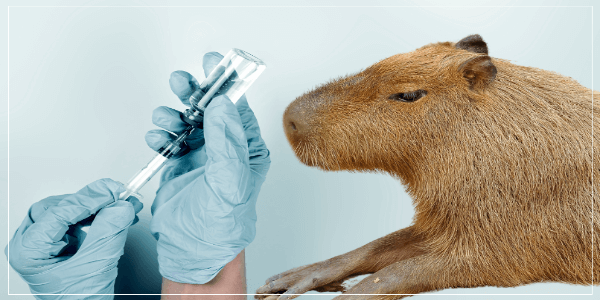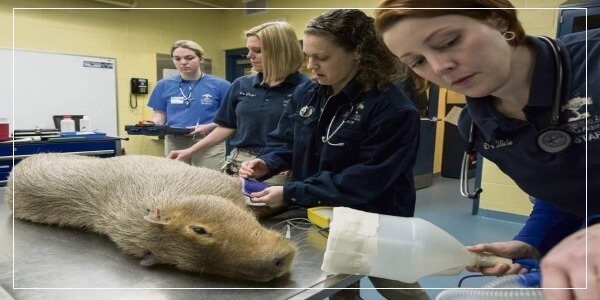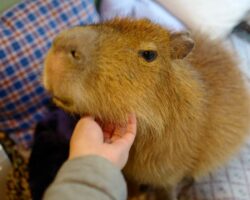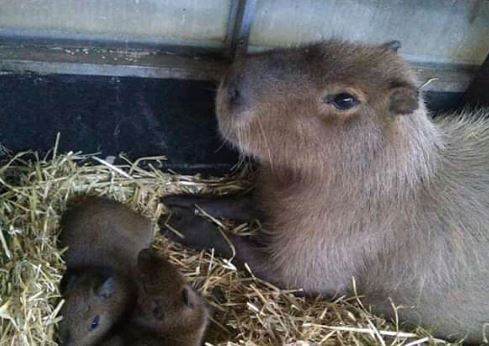Capybara Vaccination – Why Vaccinate Your Capybara?
Generally, capybara vaccination is an immunization program which consists of the administration of pathogenic agents or vaccines to the giant rodents in order to protect them from disease, or to produce antibodies that will fight infections, usually by inducing active immunity.
Vaccinating capybaras is very important because it will protect them against diseases and also common pets living amongst humans nowadays, it can protect disease transmission to their human owners. A primary reason for getting Capybara vaccinations in Kansas City, MO is that they can cause serious health problems if not treated.
For example, the Capybara can carry Leptospirosis which is a bacteria that causes fever, headache and jaundice. This condition can be fatal if not treated immediately.
Another health issue that Capybaras can cause is Parvovirus. This virus causes vomiting, diarrhea, lethargy and bleeding of the eyes and nose. Parvovirus affects young children more often than adults but it can still be deadly if left untreated.
There are several types of vaccines available for Capybaras including Bordetella pertussis (whooping cough), Canine Distemper Virus and Parvovirus-2. We recommend getting all three vaccinated at once due to their close proximity in age (12 months).
At What Age Do Capybaras Get Vaccinated
There is no “best age” to vaccinate a capybara. The main reason for this is that there are many different types of vaccines and vaccines are different for each type of animal, not just for their species. Vaccines can be given either by injection or orally and the latter has been shown to be more effective than the former.
The best way to determine the best age for your capybara to receive vaccinations is by looking at their lifestyle and environment. For example, if you have multiple pets in your household, such as cats and dogs, it may be best to offer all of them a vaccination together since they share common environments and may be exposed to similar diseases on a daily basis. This will also help reduce any stress that may occur when giving one versus another pet its first vaccination.
Another factor that can play into determining when your capybara should receive vaccinations is if it has lived with other animals or humans before receiving its first vaccination shot or not. If it has lived with other pets or people in the past, then it may already have had exposure to disease-causing organisms such as bacteria or viruses that could make it more susceptible to contracting an illness after being vaccinated against those organisms; however
You can vaccinate your capybara at least once a year, but it’s best to do it more often during the winter months.
The first step in vaccinating your capybara is to get it checked out by a veterinarian. The vet will check your pet for any health problems or allergies it might have and give it an initial exam. It’s important that this checkup be done before you bring your pet home from the breeder or from a pet store.
After checking out your capybara, the veterinarian may recommend that you have it vaccinated against distemper and rabies. While distemper vaccines are usually administered at seven weeks old, they can also be given at 12 weeks old if there’s no other option available. Rabies vaccinations can be given between 14 and 21 days of age depending on when you receive them during the year; again, this depends on whether or not you want your pet to be vaccinated against rabies every year or only every three years as required by law in some states.
Are Vaccination Safe for Capybaras
Vaccination is safe for capybaras. Vaccines that are safe for humans can also be used safely on capybaras. Vaccinating capybaras is an effective way to prevent diseases that are dangerous to both animals and humans.
However, it is important to remember that vaccinating the capybara does not protect the animal from disease or infection. The vaccine must be given at the correct dose and administered by a trained medical technician in order to be effective.
You can vaccinate your pet for Capybara Pneumovirus (CPV) and PRRS-FIV combo vaccines.
The CPV vaccine is available from the Vets4Pets website or from our clinic. The vaccine is given by injection and is given annually. We recommend that you introduce your capybara to the vaccine at 6 months of age and complete the vaccination series over 12 weeks. The PRRS-FIV vaccine is also given by injection and is only available from Vets4Pets.
What Happens if You Don’t Vaccinate Your Capybara
If you don’t vaccinate your pet, your capybara can get contract diseases that may even lead to his death. Not vaccinating is the number one reason why you capybaras go to the vet for medical care. Many people believe that it is a personal choice whether or not to vaccinate their pets and that there are no negative consequences. But this just isn’t true. There are many risks associated with not vaccinating your pets, including:
1) Puppies and kittens born to unvaccinated mothers can develop serious diseases like parvovirus, distemper, and rabies;
2) Older capybaras who were vaccinated as puppies may still need booster shots.
3) Your pet’s immunity can decline over time if he was never vaccinated as an adult.
Can Capybaras Die at Night – Signs Of A Capybara Dying [Revealed]
When should capybaras stop vaccinating?
The answer is when they stop producing milk. This is normally when they are between 8 and 10 years old. It’s important to note that the vaccination process can be reversed at any time if you decide it’s not for you anymore.
Capybaras are naturally immune to many diseases, including distemper, hepatitis and parvovirus. They also have a strong resistance to rabies. However, there are still times when vaccinations are necessary for your capybara’s health. This includes:
- When you bring your new capybara home from the breeder or pet store;
- When you move into a new area where there may be unknown diseases; and
- When your pet becomes sick (i.e., develops diarrhea or changes in behavior).



![Capybara Meat And Its Culinary Uses - [Every You Should Know] Capybara Meat & Culinary Uses](https://capybaratips.com/wp-content/uploads/2023/03/Capybara-meat-250x200.webp)





